Nature Knows and Psionic Success
God provides
Essential oils can alleviate the symptoms of perimenopause

( Natural News ) Women in their 40s may start to experience the symptoms of perimenopause. During this period, a woman’s hormones may shift before she experiences actual menopause . While perimenopause is a natural part of a woman’s life, it is also associated with some unpleasant symptoms like fatigue and irritability. Fortunately, natural remedies like essential oils can alleviate these symptoms. Perimenopause and hormonal shifts Perimenopause can cause hormonal shifts that can significantly affect quality of life, and some women who experience this condition often suffer from anxiety and discomfort. Even prior to menopause , women should make an effort to support their hormonal health. Perimenopause occurs before menopause when a woman’s hormone levels and ovarian function start to decline. This can cause symptoms like changes in menstrual flow, irregular periods, and spotting. As your estrogen, progesterone, and testosterone levels gradually decline, you may also experience symptoms such as : Brain fog Breast tenderness Decreased libido Hot flashes Increased belly fat Insomnia Mood symptoms (e.g., anxiety, depression , and irritability) Night sweats Problems concentrating Short-term memory problems Sleep disturbances Uterine bleeding problems Vaginal dryness If you’re a woman in your 40s, this phase is a particularly busy time in your life, especially if you have a family of your own: Your attention is often divided between your spouse, children, and parents, leaving little to no time for self-care. If you’re stressed, you may rely on caffeine or sugar to get through the day, but these substances can aggravate the symptoms of perimenopause. 100% organic essential oil sets now available for your home and personal care, including Rosemary, Oregano, Eucalyptus, Tea Tree, Clary Sage and more, all 100% organic and laboratory tested for safety. A multitude of uses, from stress reduction to topical first aid. See the complete listing […]
These 3 herbs treat depression naturally
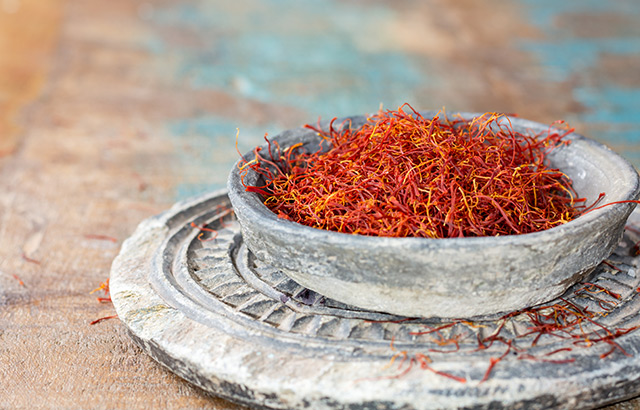
( Natural News ) People who don’t suffer from clinical depression don’t always give it the weight it deserves. Far more than just an extended bout of “the blues” that everyone experiences from time to time, depression can take over your life, impacting your work, your family, your social life, and even your physical health. Unfortunately, most of the treatments doctors prescribe for depression don’t do much to improve patients’ situations. Largely ineffective and causing a host of side effects that include suicide, antidepressants simply aren’t a good option for many people. Thankfully, several herbs can help alleviate this condition naturally. Here is a look at three good choices . Saffron Saffron is perhaps best known among Americans as the herb that gives paella its distinctive color, but that’s just the tip of the iceberg. This herb offers a long list of health benefits that include fighting inflammation and tumors – and depression. It is believed that saffron stops the reuptake of serotonin (much like prescription SSRIs) as well as dopamine and norepinephrine neurotransmitters. This could help explain why saffron tea has long been used to enhance mood , and clinical trials have backed this up, finding that saffron extracts help depressed patients more than a placebo. Other studies have shown that it enhances the effects of antidepressants when taken alongside them and even helps alleviate some of their side effects. Golden root (Rhodiola Rosea) The root of this herb, which grows in the mountainous areas of Asia and Europe, has long been used to address depression, fatigue and anxiety in Russia and Scandinavia. It’s an adaptogen that raises your body’s resistance to stress overall, reducing symptoms like exhaustion, anxiety, burnout and fatigue in studies. The power of the elements : Discover Colloidal Silver Mouthwash with quality, natural ingredients […]
Presbyterian SeniorCare Network set to open Washington’s first dementia-specific assisted community

A rendering of the Woodside Place project Seniors in the Washington area affected by dementia or Alzheimer’s will soon be able to receive specialized memory care at Presbyterian SeniorCare Network this fall. Woodside Place of Washington is Washington’s first dementia-specific assisted community, designed to help residents with their physical, mental and social needs. The community features 36 residential rooms in the two-story building on South Main Street. Senior Director of Finance Greg Malisky said what sets apart this community is the technology that is going into the building. “Our building isn’t just a facility, it’s a community,” Malisky said. “We have spent hundred of thousands of dollars to get this place the best technology for our residents. Some places don’t do that, but we think it is necessary so our residents can have the best quality and environment to heal in.” Malisky said there is unique technology that is implemented into the building to help residents with memory. A computer software program called ‘It’s Never 2 Late’ prompts the residents to use the program by showing them personalized content such as music, photos and familiar surroundings. Along with computer software, the new building will use circadian lighting. Circadian lighting is a specific type of lighting system that mimics natural light, which helps increase awareness during the day. Malisky said this also helps reduce “sundowning,” which happens when dementia patients get confused and frustrated during the later hours of the day. “The natural lighting helps heal patients,” Malisky said. “It helps them function better not just during the day, but also at night.” The areas for residents are called “neighborhoods,” which are going to be designed like Washington County neighborhoods to remind residents of places they’re familiar with. There will be communal and dining spaces for residents to socialize. Along […]
Combating Modern-Day Anxiety with Nootropic Supplements

For millennia, we just followed animals around. We worked together in tribes to hunt, fish, plant, harvest, build shelter, and handle every other material need as a unit – for the most part. Then, the agricultural and industrial revolutions happened, and the last one percent of human existence until now became a whirlwind of technological breakthroughs. The result? 40 million of us are diagnosed with anxiety and/or depression, and that’s just in the United States, according to recent statistics . We sit in cubicles and work all day so we can provide for our families. No more mud between the toes, no more building shelters, no more community collaboration! Psychologists believe that anxiety and depression are so prevalent now because the human brain, having acclimatized to a nomadic/pastoral existence, is unable to handle the rigors of modern life. Where many of us turn to risky prescription drugs to bridge this gap, there is another option: nootropics. Nootropics: What and How? The term “nootropic” refers to a class of natural and synthetic substances used to enhance one or more of our mental faculties; concentration, alertness, mood, memory, cognition, and so forth. Nootropics can take the form of pills, powders, herbal teas, and other forms of food. When used properly, some nootropics can ameliorate anxiety symptoms significantly. Okay, you may be saying, but how? How does a nootropic fight anxiety and improve mental performance? There are several mechanisms by which these substances can reap their benefits. Some nootropics stimulate receptors in the brain that allow for important functions, like memory or sleep. Other nootropics can mimic the action of neurotransmitters (chemical messengers) that promote calmness and destimulation. Additionally, some nootropics can improve blood supply to the brain and combat the harmful processes introduced by free radical exposure. Five Nootropics for Anxiety […]
This morning brain boost keeps you sharp all day

As we age, cognitive problems can start to creep in… and no one wants to see that happen. One of the areas that can become more challenging with age is decision making. Yet, the decisions we make in later life can substantially affect our finances, our health, and our independence. Luckily, a new study, known as the ‘Brain Breaks’ study, led by the Baker Heart and Diabetes Institute and The University of Western Australia has now given us a quick way to ensure improve our cognitive performance, including our decision making, all day. But not only that… it’s a habit that can keep your brain growing too… Give your brain an instant boost The study followed 65 older Australians, between the ages of 55 and 80 to examine the power of exercise to positively change your cognitive function and short-term memory. They separated the participants into three groups: First, was the sedentary group, who spent all day sitting (I bet you can imagine how this group fared); A second group performed moderately intense exercise to start their morning; And a third group did the morning exercise plus took brief three-minute walking breaks during an 8-hour day of otherwise prolonged sitting. The team assessed all aspects of their cognition and concentration including psychomotor function, attention, executive function such as decision-making, visual learning, and working memory. And, here’s what you need to know… Related: 2 simple methods to try for better memory recall The benefits of morning exercise were clear. In fact, the researchers found that exercising in the morning can help you improve your cognitive performance and decision-making across the day. And, it gets even better when you add in those brief walking breaks. The Australian team found that combining a morning bout of exercise with brief light-intensity walking breaks […]
The upside to dyslexia, even as a journalist
As a parent, if you were told your child would be a creative, intelligent, big-picture thinker with a strong sense of grit and resilience, you’d be happy, wouldn’t you? That sounds like a great set of skills for life success, doesn’t it? Now, what if you were also told that your child would have trouble learning to read and write for the rest of his or her life? Like two sides of a coin, dyslexia is a gift and a struggle. I know this because I’m dyslexic. So is my youngest child. It’s genetic and extremely common. It’s estimated that 1 in 5 people have dyslexia. Dyslexia is, put simply, a different wiring of the brain. It is not a measure of intelligence. Dyslexic brains find it difficult to recognize how sounds, words and letters match up phonetically. It’s an alternative way of thinking. While dyslexic minds process information differently, in lateral way, it also means we are singing a different tune when it comes to literacy, memory and concentration. Then there’s the speling (spelling). In fact, just having to spell “dyslexic” is a constant frustruation (frustration). As I’ve been writing this I’ve spelt it “dylesic” “dyslexic” and “dsyleix.” During our coverage of special counsel Robert Mueller’s report on his investigation, I don’t think I ever wrote soepena (subpoena) correctly. Because of our trouble with spelling, if there was shrine or diety (deity) for autocorrect and spellcheck, dyslexics like me would worship at it. Obvioulsy (obviously), spelling tests, rote learning, reading aloud in class and standardized tests all work against dyslexics in the classroom. Outside of the traditional classroom though, many dyslexics thrive. More struggle, and more perseverance My late father was never diagnosed with dyslexia, but probably had it. After all, he misspelled “Granddad” inside his last gift […]
Column: Here’s what gets lost when we rely on GPS

M.R. O’Connor It has become the most natural thing to do: get in the car, type a destination into a smartphone, and let an algorithm using GPS data show the way. Personal GPS-equipped devices entered the mass market in only the past 15 or so years, but hundreds of millions of people now rarely travel without them. These gadgets are extremely powerful, allowing people to know their location at all times, to explore unknown places and to avoid getting lost. But they also affect perception and judgment. When people are told which way to turn, it relieves them of the need to create their own routes and remember them. They pay less attention to their surroundings. And neuroscientists can now see that brain behaviour changes when people rely on turn-by-turn directions. In a study published in Nature Communications in 2017, researchers asked subjects to navigate a virtual simulation of London’s Soho neighbourhood and monitored their brain activity, specifically the hippocampus, which is integral to spatial navigation. Those who were guided by directions showed less activity in this part of the brain than participants who navigated without the device. “The hippocampus makes an internal map of the environment and this map becomes active only when you are engaged in navigating and not using GPS,” Amir-Homayoun Javadi, one of the study’s authors, told me. The hippocampus is crucial to many aspects of daily life. It allows us to orient in space and know where we are by creating cognitive maps. It also allows us to recall events from the past, what is known as episodic memory. And, remarkably, it is the part of the brain that neuroscientists believe gives us the ability to imagine ourselves in the future. Studies have long shown the hippocampus is highly susceptible to experience. (London’s taxi […]
5 of the best techniques to try that help you fall asleep

Photo Credit: www.pixabay.com When you go to bed, hoping for some respite from the day’s duties, does it take an uncomfortably long while to drift off to dreamland? Sleep is a basic, essential physiological need which has a direct influence on your mental, physical and emotional well-being. Therefore, a lack of sleep negatively impacts your ability to think, your memory, your emotional state in day-to-day situations and even your weight. If you find yourself tossing, turning and frustrated that sleep remains elusive, we have good news for you. With a few simple but effective alterations to your routine and sleep habits, you will be surprised by the positive changes you will see in both your sleep quality and performance throughout the day. Be in sync with your circadian rhythm Your circadian rhythm is what causes you to feel active and drowsy at the same times every day. It is your body’s ability to regulate its activity cycles based on the external stimulus of light and darkness. By paying attention to the signals your body gives, you will be able to fall asleep on time consistently. Being in tune with your natural sleep-wake cycle and regularising the times at which, and the number of hours, you sleep, will ensure you wake up bright and ready for the following day. Perhaps napping late in the evenings is messing with your sleep rhythm? Either shift your naps to early in the afternoon or fight the drowsiness altogether and go to bed earlier than usual. While it takes some time to get into a proper sleep schedule, once your mind and body realise that you are meeting their daily rest requirements, you will feel a boost in energy and productivity that knows no bounds. Get ready way before bedtime One of the most […]
Opinion: Here’s what gets lost when we rely on GPS

Explore Recipes and Stories It has become the most natural thing to do: get in the car, type a destination into a smartphone, and let an algorithm using GPS data show the way. Personal GPS-equipped devices entered the mass market in only the past 15 or so years, but hundreds of millions of people now rarely travel without them. These gadgets are extremely powerful, allowing people to know their location at all times, to explore unknown places and to avoid getting lost. But they also affect perception and judgment. When people are told which way to turn, it relieves them of the need to create their own routes and remember them. They pay less attention to their surroundings. And neuroscientists can now see that brain behavior changes when people rely on turn-by-turn directions. In a study published in Nature Communications in 2017, researchers asked subjects to navigate a virtual simulation of London’s Soho neighborhood and monitored their brain activity, specifically the hippocampus, which is integral to spatial navigation. Those who were guided by directions showed less activity in this part of the brain than participants who navigated without the device. “The hippocampus makes an internal map of the environment and this map becomes active only when you are engaged in navigating and not using GPS,” Amir-Homayoun Javadi, one of the study’s authors, told me. The hippocampus is crucial to many aspects of daily life. It allows us to orient in space and know where we are by creating cognitive maps. It also allows us to recall events from the past, what is known as episodic memory. And, remarkably, it is the part of the brain that neuroscientists believe gives us the ability to imagine ourselves in the future. Studies have long shown the hippocampus is highly susceptible to experience. […]
Neurons’ “antennae” are unexpectedly active in neural computation
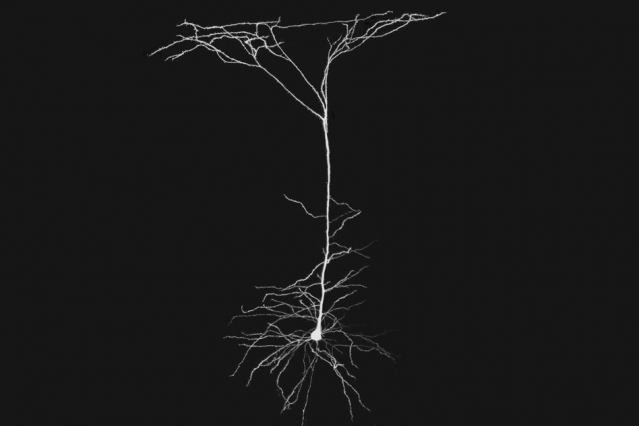
Tiny, branching extensions called dendrites may be more than just passive information-carriers, study finds. MIT neuroscientists have found that neural extensions called dendrites, which act as antennae to help neurons listen to their neighbors, play a more active role in neural computation than previously thought. Image: Lou Beaulieu-Laroche Most neurons have many branching extensions called dendrites that receive input from thousands of other neurons. Dendrites aren’t just passive information-carriers, however. According to a new study from MIT, they appear to play a surprisingly large role in neurons’ ability to translate incoming signals into electrical activity. Neuroscientists had previously suspected that dendrites might be active only rarely, under specific circumstances, but the MIT team found that dendrites are nearly always active when the main cell body of the neuron is active. “It seems like dendritic spikes are an intrinsic feature of how neurons in our brain can compute information. They’re not a rare event,” says Lou Beaulieu-Laroche, an MIT graduate student and the lead author of the study. “All the neurons that we looked at had these dendritic spikes, and they had dendritic spikes very frequently.” The findings suggest that the role of dendrites in the brain’s computational ability is much larger than had previously been thought, says Mark Harnett, who is the Fred and Carole Middleton Career Development Assistant Professor of Brain and Cognitive Sciences, a member of the McGovern Institute for Brain Research, and the senior author of the paper. “It’s really quite different than how the field had been thinking about this,” he says. “This is evidence that dendrites are actively engaged in producing and shaping the outputs of neurons.” Graduate student Enrique Toloza and technical associate Norma Brown are also authors of the paper, which appears in Neuron on June 6. “A far-flung antenna” Dendrites receive […]
The Popular Diet One Neurosurgeon Swears By as a Way to Boost Your Brainpower

In this excerpt from his new book Neurofitness , Dr. Rahul Jandia explains why intermittent fasting is so good for the brain. Perhaps there is a reason why most of the world’s major religions call for periodic fasting. Intermittent hunger clears the mind, awakens the senses, and improves brain functioning. Plus it lowers your blood sugar, reduces your insulin levels, and helps you lose weight by reducing total calories. What’s not to love? Well, the hunger. But it only lasts for a short time! Consider our prehistoric ancestors, the hunters and gatherers who survived through feast and famine, abundance and scarcity. The real “ Paleo diet ” didn’t consist of just large hunks of meat. Many were the days and weeks they failed to catch an auroch or boar and went to sleep hungry. Lose 10 Pounds in 3 Days Diet Best Brain Boosting Supplements But with the hunger pangs come benefits. Going without food for even a day increases your brain’s natural growth factors, which support the survival and growth of neurons. Evolution designed our bodies and brains to perform at their peak as hybrid vehicles. Metabolic switching between glucose and ketones is when cognition is best and degenerative diseases are kept at bay. As a recent paper in Nature Reviews Neuroscience put it: “Metabolic switching impacts multiple signaling pathways that promote neuroplasticity and resistance of the brain to injury and disease.” RELATED: The Healthiest Way to Do Intermittent Fasting, According to a Nutritionist So how do you do it? Not by overloading on glucose or ketones [the energy source produced when the liver burns fat], but by altering the cadence of eating and letting the body do what it was designed to do during times of food scarcity. I’m not talking about caloric restriction, which extends longevity […]
Healthy life: 12 plants and herbs considered natural remedies

Lavender oil is known for its calming and relaxing properties, and has been used aroma therapeutically for alleviating insomnia, anxiety, depression, restlessness, and stress Garlic, lavender and thyme have been named in a list of common plants that contain natural healing properties. Garden gurus at shed retailer BillyOh.com have named 12 flowers and herbs that can be used to treat a variety of ailments including digestive issues, anxiety, and inflammation. A kitchen essential, garlic also possesses antimicrobial properties and can be used for lowering cholesterol and blood pressure. And whilst peppermint is predominantly used to flavour toothpaste and chewing gum, it can also help to soothe sore muscles when applied as a liquid or lotion. A spokesperson for BillyOh.com said: “Who knew that the pesky dandelion weed can also be used to improve liver function? So perhaps think twice before pulling them all up from your lawn this summer. “We’d always recommend speaking to a health professional before delving into the world of natural remedies, but there’s no harm adding a little extra coriander, ginger or thyme to your dishes next time you cook!” 1. Coriander Coriander boasts a unique flavour that people either love or hate, and is often used to garnish Mexican and Thai dishes. The seeds are also a prime ingredient in Indian curries. Research shows it’s also a powerful digestive aid and may even be capable of removing metals and other toxic agents from the body. 2. Peppermint Often used as the predominant flavour in toothpaste and chewing gum, when brewed as tea, peppermint may also relieve digestive discomforts such as indigestion and vomiting. It can also soothe sore muscles when applied as a liquid or lotion. 3. Dandelion This flowering plant has traditionally been used as a liver tonic, useful for detoxification and improving […]
How to Be a Better Salesperson in Your Small Business
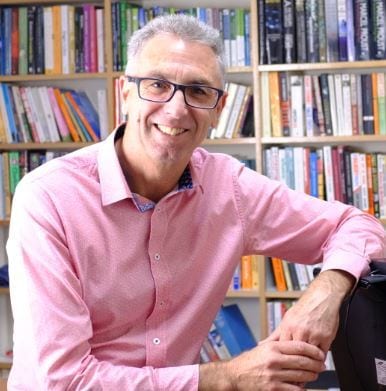
Feel free to share… Every week as SmallBizLady , I conduct interviews with experts on my Twitter talk show #SmallBizChat. The show takes place every Wednesday on Twitter from 8-9pm ET. This is excerpted from my recent interview with sales expert, Mike Adams @MikeAdamsSales . He taught himself storytelling ‘on the job’ while selling and managing sales teams for international corporations including Siemens, Nokia, and Halliburton. Since 2014, he has been helping companies win more business through his storytelling consulting practice. He is the author of Seven Stories Every Salesperson Must Tell . Mike is based in Melbourne, Australia . For more information : www.thestoryleader.com SmallBizLady: What is the biggest challenge small businesses have with sales? Mike Adams: Small businesses don’t have the advantage of being a well-known brand, so they must grow organically via the stories their clients, partners, and friends tell about them. We call that referral-selling, and it can (and must) be managed as a process . SmallBizLady: How can leveraging stories enable a salesperson to shorten their sales cycle? Mike Adams: Sales cycle times reduce as trust increases. The right story at the right time in the buying cycle dramatically increases trust and speeds up the process. “Connection stories, such as your personal story and company story, position you as relatable and as an authority in your field. Values stories teach your buyer how your company will behave if things go wrong – which reduces your buyer’s perception of risk. Success stories allow your buyer to ‘experience’ your products and services before they buy – again, reducing risk and increasing buyer comfort. SmallBizLady: You wrote the book ‘Seven Stories Every Salesperson Must Tell.’ What are the seven stories? Mike Adams: There are 3 story types: HOOK, FIGHT, and LAND. HOOK stories are stories that connect: […]
The upside to dyslexia, even as a journalist
As a parent, if you were told your child would be a creative, intelligent, big-picture thinker with a strong sense of grit and resilience, you’d be happy, wouldn’t you? That sounds like a great set of skills for life success, doesn’t it? Now, what if you were also told that your child would have trouble learning to read and write for the rest of his or her life? Like two sides of a coin, dyslexia is a gift and a struggle. I know this because I’m dyslexic. So is my youngest child. It’s genetic and extremely common. It’s estimated that 1 in 5 people have dyslexia. Dyslexia is, put simply, a different wiring of the brain. It is not a measure of intelligence. Dyslexic brains find it difficult to recognize how sounds, words and letters match up phonetically. It’s an alternative way of thinking. While dyslexic minds process information differently, in lateral way, it also means we are singing a different tune when it comes to literacy, memory and concentration. Then there’s the speling (spelling). In fact, just having to spell “dyslexic” is a constant frustruation (frustration). As I’ve been writing this I’ve spelt it “dylesic” “dyslexic” and “dsyleix.” During our coverage of special counsel Robert Mueller’s report on his investigation, I don’t think I ever wrote soepena (subpoena) correctly. Because of our trouble with spelling, if there was shrine or diety (deity) for autocorrect and spellcheck, dyslexics like me would worship at it. Obvioulsy (obviously), spelling tests, rote learning, reading aloud in class and standardized tests all work against dyslexics in the classroom. Outside of the traditional classroom though, many dyslexics thrive. More struggle, and more perseverance My late father was never diagnosed with dyslexia, but probably had it. After all, he misspelled “Granddad” inside his last gift […]
Tim Cook, Michelle Obama rise at 4 am every day – but does waking up early guarantee success?

Tim Cook rises a little before 4 a.m. every day, and Michelle Obama goes to the gym around the same time. By Adam Popescu Tim Cook, the CEO of Apple, rises a little before 4 a.m. every day. President Donald Trump wrote in his 2004 book that he only needs four hours of sleep a night. David Cush, the former Virgin America CEO, has said that he wakes up at 4:15. And Jennifer Aniston wakes up around 4:30 to meditate, as does Kris Jenner, the same time that Michelle Obama is hitting the gym. Recently, Steve Harvey declared: “Rich people don’t sleep eight hours a day.” Is the key to success emulating high-profile achievers who are hacking their bodies to increase productivity? Even if capitalism favors early wake-up times, at least as a badge of honour, there is no data that shows that successful people get less sleep. Americans sleep, on average, less than seven hours a night, which means that many of us get less sleep than the American Academy of Sleep Medicine recommends. “This trend goes back a fair bit further than our recent tech CEOs,” said Douglas B. Kirsch, a neurologist and the president of the American Academy of Sleep Medicine. “Thomas Edison used to say the same thing: Four hours are good enough for me. What he left out of the picture is he was a pretty prolific napper as well.” Kirsch said that this early rising trend propagated by entertainers and entrepreneurs is deeply troubling. And while some people seem to need less sleep than others, we can’t game our body clocks. What happens when we don’t get enough sleep? In a 2003 study, researchers at the University of Pennsylvania and Harvard Medical School found that reaction times and performance on cognitive tasks plummet […]
Move your feet to prevent dementia: Research shows exercise boosts brain function
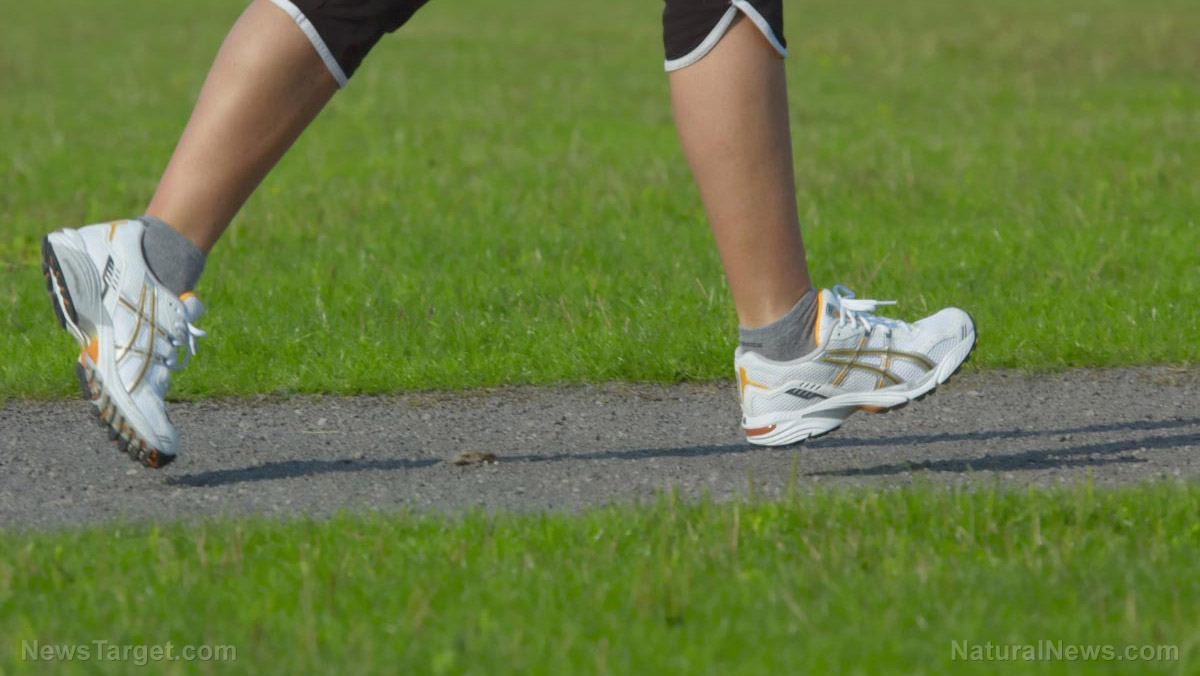
( Natural News ) Walking has long been linked to multiple health benefits, but a recent study from the University of Maryland suggests that it could be the key to preventing dementia . In the study, which was published in the Journal of Alzheimer’s Disease , researchers looked at the effects of exercise, specifically walking, on the brain function of a group of adults with mild cognitive impairment (MCI). People with MCI experience cognitive changes that are serious enough to be noticed but are not severe enough to interfere with daily life. Amnestic MCI primarily affects the memory, while non-amnestic MCI mostly affects thinking skills. MCI affects up to 20 percent of elderly Americans . While the cause of MCI remains uncertain, evidence suggests that it increases the risk of Alzheimer’s disease and other forms of dementia . Estimates show that the economic costs caused by dementia grow at a rate of 15.94 percent annually, up from $279·6 billion in 2000 to $948 billion in 2016. Europe and North America bear the highest dementia-related economic burden globally. The study observed 17 adults with MCI and 18 healthy adults who functioned as control; all of them were between the ages of 61 and 88. The exercise intervention lasted 12 weeks and included four 30-minute sessions of moderate intensity walks on the treadmill per week. Exercise intensity was progressively increased over the first four weeks. The participants also engaged in 10 minutes of light activity as warm-up and cool-down. The treadmill speed and grade were gradually increased per session to promote increases in aerobic fitness. It focused on changes in cerebral blood flow in specific brain regions that are known to be involved in the development of Alzheimer’s disease. These are parts of the brain that affect perception, motor control, self-awareness, […]
Prepper health: Understanding sleep cycles so you can get some rest during a crisis

( Natural News ) Lack of sleep can negatively affect your physical and mental condition, especially during a disaster scenario. But learning about sleep cycles and having good sleep habits can prevent common problems associated with poor sleep quality. (h/t to BeansBulletsBandagesAndYou.com ) Sleep deprivation is linked to a decline in cognitive ability. This means you can make wrong decisions during time-sensitive scenarios, which can endanger your life when SHTF. When a group of individuals is left undisturbed in an unchanging environment with no contact with the outside world, most people will sleep for at least seven to nine hours out of the 23- to 26-hour “days” they naturally fall into, with their internal clocks setting the rhythm. Giving this group access to natural daylight can help adjust their rhythms to the regular 24-hour cycle, but these individuals will still sleep for seven to nine hours every night. If the group is only allowed to sleep for an average of fewer than 7.5 hours a night, their ability to process and remember information will decline. Once the group is made to sleep for less than 5.5 hours a night, they will begin to notice that their cognitive function is negatively affected. The mechanism that runs this natural cycle relies on melatonin. Melatonin and sleep quality Melatonin is a hormone released by the pineal gland in the brain. It is often called the “sleep hormone” because high levels of melatonin can help you fall asleep . But the hormone itself doesn’t make you sleep. Instead, melatonin makes your body think that it’s night-time so you can fall asleep faster. Melatonin is also a potent antioxidant with many health benefits such as improving eye health and increasing growth hormone levels in men. The power of the elements : Discover Colloidal Silver […]
3 well-being factors that make your golden years golden
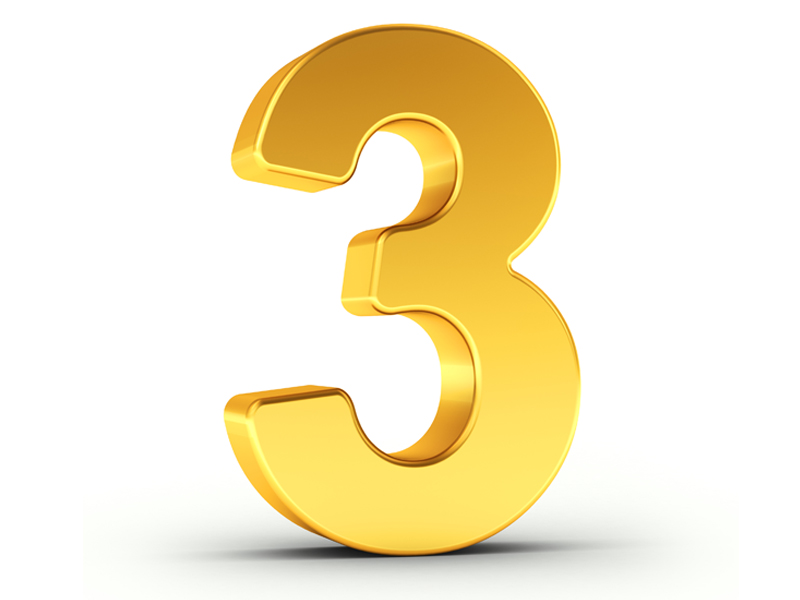
Here’s something you probably already know: Being active on a regular basis keeps your body young and fit. Even some vigorous housework can improve your physical health as much as a session at the gym ! Regular physical activity also promotes good mental and emotional well-being. That’s a pretty well-accepted idea. There’s nothing like a good, brisk walk in the fresh air to help reclaim your afternoon and get things done, despite that “2:00 slump.” Aerobic exercise and strength training have been shown to help with depression and anxiety. And even those “down-in-the-dumps” days we all experience from time to time can be cut almost in half with just two hours of exercise a week ! Surprisingly, though, it seems that the relationship between exercise and well-being, both physical and emotional, travels in both directions. Those who exercise are happier, healthier and more emotionally stable. But recent research reveals that if you are mentally and emotionally healthy, you will be far more likely to continue the physical activity that will keep you that way well into old age. Emotional well-being keeps you active In a recent Finnish study, the Jyväskylä Longitudinal Study of Personality and Social Development, researchers took a closer look at the relationship between physical activity and mental and emotional well-being, particularly in middle-age. They wanted to find out whether leisure-time physical activity (LTPA) was a predictor of mental well-being at age 50, or if it was the factor that promoted that mental well-being. They also distinguished among several types of well-being, and were interested in finding out whether specific leisure-time physical activities were associated with each: Emotional well-being was defined as overall satisfaction with life and the tendency to have positive feelings. Psychological well-being refers to having a sense of purpose in life. And social well-being […]
What gets lost when we rely on GPS
The hippocampus is crucial to many aspects of daily life. It allows us to orient in space and know where we are by creating cognitive maps. It also allows us to recall events from the past, what is known as episodic memory. And, remarkably, it is the part of the brain that neuroscientists believe gives us the ability to imagine ourselves in the future. Studies have long shown the hippocampus is highly susceptible to experience. (London’s taxi drivers famously have greater gray-matter volume in the hippocampus as a consequence of memorising the city’s labyrinthine streets.) Could using a GPS result in a withering of the Hippocampus? Chris Hopkins Meanwhile, atrophy in that part of the brain is linked to devastating conditions, including post-traumatic stress disorder and Alzheimer’s disease. Stress and depression have been shown to dampen neurogenesis – the growth of new neurons – in the hippocampal circuit. What isn’t known is the effect of GPS use on hippocampal function when employed daily over long periods of time. Javadi said the conclusions he draws from recent studies is that "when people use tools such as GPS, they tend to engage less with navigation. Therefore, brain area responsible for navigation is less used, and consequently their brain areas involved in navigation tend to shrink." Cognitive impairments How people navigate naturally changes with age. Navigation aptitude appears to peak around age 19, and after that, most people slowly stop using spatial memory strategies to find their way, relying on habit instead. But neuroscientist Véronique Bohbot has found that using spatial-memory strategies for navigation correlates with increased gray matter in the hippocampus at any age. She thinks that interventions focused on improving spatial memory by exercising the hippocampus – paying attention to the spatial relationships of places in our environment – might […]
Ditch the GPS. It’s ruining your brain.
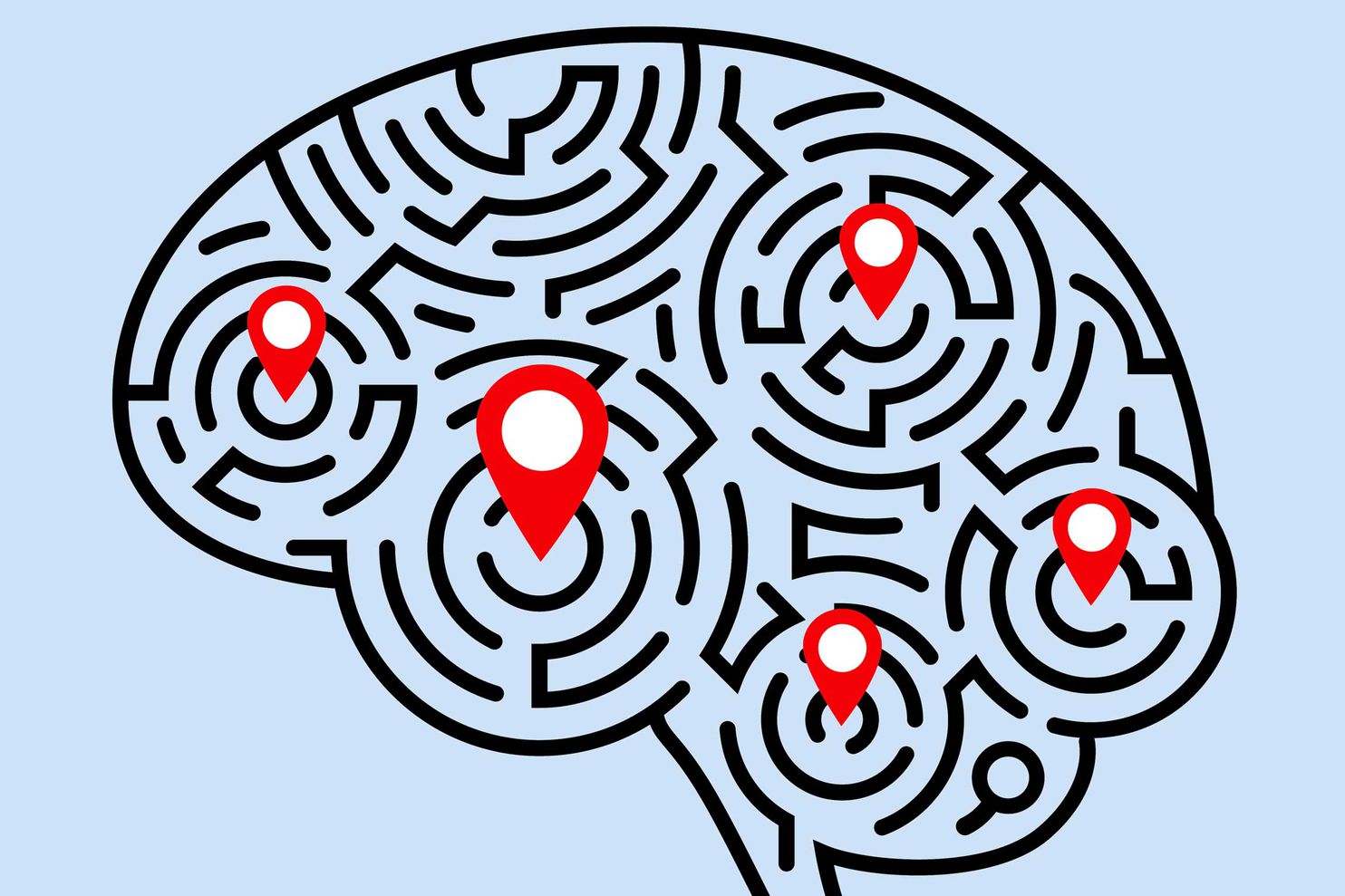
(Washington Post illustration/images by iStock) June 5 at 5:56 PM M.R. O’Connor is a journalist who writes about science, technology and ethics, and is the author, most recently, of “ Wayfinding: The Science and Mystery of How Humans Navigate the World .” It has become the most natural thing to do: Get in the car, type a destination into a smartphone, and let an algorithm using GPS data show the way. Personal GPS-equipped devices entered the mass market in only the past 15 or so years, but hundreds of millions of people now rarely travel without them. These gadgets are extremely powerful, allowing people to know their location at all times, to explore unknown places and to avoid getting lost. But they also affect perception and judgment. When people are told which way to turn, it relieves them of the need to create their own routes and remember them. They pay less attention to their surroundings. And neuroscientists can now see that brain behavior changes when people rely on turn-by-turn directions. In a study published in Nature Communications in 2017, researchers asked subjects to navigate a virtual simulation of London’s Soho neighborhood and monitored their brain activity, specifically the hippocampus, which is integral to spatial navigation. Those who were guided by directions showed less activity in this part of the brain than participants who navigated without the device. “The hippocampus makes an internal map of the environment and this map becomes active only when you are engaged in navigating and not using GPS,” Amir-Homayoun Javadi, one of the study’s authors, told me. The hippocampus is crucial to many aspects of daily life. It allows us to orient in space and know where we are by creating cognitive maps. It also allows us to recall events from the past, what […]
